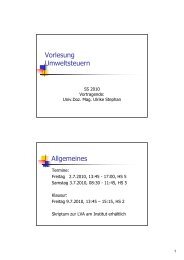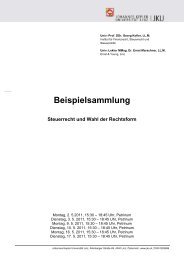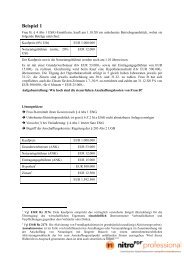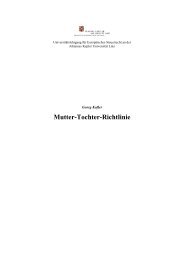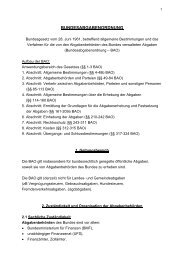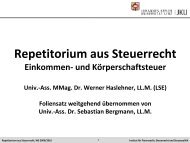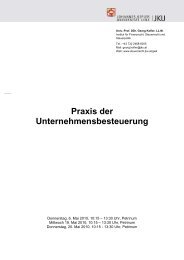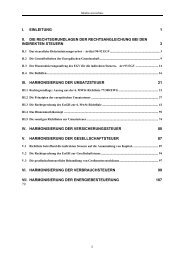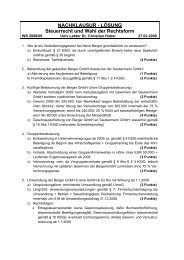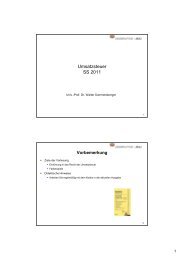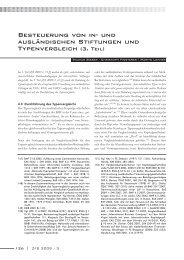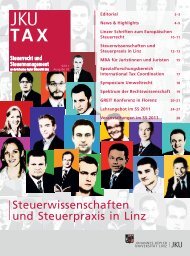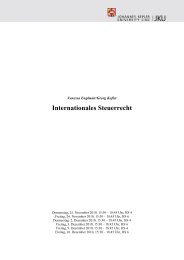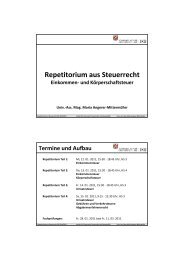European Tax Law - JKU
European Tax Law - JKU
European Tax Law - JKU
Sie wollen auch ein ePaper? Erhöhen Sie die Reichweite Ihrer Titel.
YUMPU macht aus Druck-PDFs automatisch weboptimierte ePaper, die Google liebt.
Articles<br />
tion of tax jurisdiction on the basis of nationality cannot,<br />
in itself, be considered discriminatory because, as<br />
such, that criterion is totally neutral and does not disadvantage<br />
or favour foreign taxpayers.<br />
In discussing Marks & Spencer, Ghosh wrote that the<br />
consequence of this reasoning should be that “[i]n relation<br />
to a non-resident person, with no source of profits<br />
within the jurisdiction of the taxing State, the State has<br />
not exercised jurisdiction at all”. 16 And then comes the<br />
essence of his criticism of Marks & Spencer: “To require a<br />
State to treat a non-resident as a resident is to extend its<br />
legislative jurisdiction by force and to use the negative<br />
integrative tools of the freedom as a positive integration<br />
mechanism.” 17<br />
The correct decision in principle would have been that the freedoms<br />
... were not breached by the UK group relief provisions.<br />
This conclusion results from the negative integrationist nature<br />
of the freedoms. This conclusion would also have been consistent<br />
with the Court’s previous case law. However the Court held<br />
that there was a prima facie breach but which breach was justified<br />
(and proportional). ... [T]he finding of a prima facie breach<br />
was an error. 18<br />
What the fundamental freedoms do not require is that a<br />
Member State assert jurisdiction where it has not previously<br />
done so. It is the illegitimate exercise of (here fiscal)<br />
jurisdiction, not its existence, that is the subject of<br />
the application of the freedoms. This is a shorter and<br />
more radical formulation of the same criticism made by<br />
Weber and García Prats – that the ECJ is creating positive<br />
rights for taxpayers where there are none.<br />
2.3. Two examples of inconsistency: the wrong<br />
decisions in Bosal Holding and Marks & Spencer<br />
In Bosal Holding, the ECJ’s error is based on the argument<br />
that it wrongly rejected the arguments of coherence<br />
and territoriality and that it did not accept the economic<br />
link between the profits of the foreign subsidiary<br />
and the costs of the share acquisition incurred by the<br />
parent company.<br />
In Marks & Spencer, the error is based on a variation of<br />
the same argument. As Weber put it: 19<br />
Despite the fact that the UK chose not to tax non-resident subsidiaries<br />
(which choice it has the fullest right to make), the<br />
Court has actually created a tax liability for the losses of nonresident<br />
subsidiaries in the UK, since, in principle, the losses of<br />
the subsidiaries have to be taken into account at the level of the<br />
parent company. This is a major breach of Member States’ sovereignty.<br />
Because the United Kingdom relinquished tax jurisdiction<br />
over foreign subsidiaries, it had no obligation whatever<br />
under the fundamental freedoms of the EC Treaty<br />
to take into account the losses of foreign subsidiaries,<br />
and there was no legal basis for creating rights for foreign<br />
taxpayers over which the UK has no jurisdiction.<br />
2.4. Conclusions<br />
The result of this analysis is fairly devastating for the ECJ<br />
case law. The ECJ is exceeding its judicial mandate, it<br />
does not heed the basic principles of national and inter-<br />
national tax policy and, by unlawfully extending its<br />
powers, it creates taxing rights in cases where there<br />
should be none, in particular in “outbound” cases. It is<br />
clear that such fundamental criticisms deserve some<br />
answers, although the answer here concentrates mainly<br />
on the issue of how far the powers of the ECJ reach<br />
under the fundamental freedoms.<br />
3. Answering the Criticisms: What Should the<br />
ECJ Do?<br />
3.1. The ECJ’s consistency in applying the basic<br />
principles<br />
3.1.1. Bosal Holding<br />
Was the ECJ not coherent in the Bosal Holding decision?<br />
From an economic point of view, the argument has been<br />
made that there was a direct link between the profits of<br />
the foreign subsidiary and the interest deduction on the<br />
loan contracted by the Dutch parent company to acquire<br />
the shares of the subsidiary. Since the subsidiary’s profits<br />
were not subject to tax, the interest deduction should not<br />
be allowed against the parent company’s profits. It was<br />
argued that the interest deduction should be taken by<br />
the subsidiary, not by the parent company.<br />
This reasoning overlooks the fact that there is no direct<br />
link, even from an economic point of view, between the<br />
interest expense and the profits of the subsidiary. Economically,<br />
there are indeed two steps, not one, to be<br />
made between the interest deduction and the profits of<br />
the subsidiary. The direct link is between the interest due<br />
on the loan and the acquisition of the shares of the subsidiary.<br />
The acquisition of the shares does not by itself<br />
result in profits either for the subsidiary or for the parent.<br />
In the case of a purchase of the shares for cash, the<br />
cash paid does not even belong to the subsidiary. It<br />
belongs to the parent. The subsidiary is obliged to<br />
finance its current operations by sources other than the<br />
loan contracted for the acquisition of the shares. Therefore,<br />
it would not be economically correct to deduct the<br />
interest expenses paid for the acquisition of the shares of<br />
the subsidiary from its profits. The interest should be<br />
deducted only from the income distributed on the<br />
shares. According to international tax principles, such<br />
dividend distributions to the foreign parent company<br />
can be made subject to the corporate income tax in its<br />
residence country, but not in the residence country of<br />
the subsidiary. Therefore, the interest deduction should<br />
be accounted for in the residence country of the parent<br />
company.<br />
The same reasoning also overlooks the existence of two<br />
legal dividing lines between the Dutch parent and the<br />
foreign subsidiary. The companies are two distinct legal<br />
entities and therefore two distinct taxpayers. In a consolidation<br />
regime, this dividing line could of course be<br />
16. Ghosh, supra note 7, at 81.<br />
17. Id.<br />
18. Id. at 82.<br />
19. Weber, supra note 12, at 124.<br />
92 BULLETIN FOR INTERNATIONAL TAXATION MARCH 2008 © IBFD



